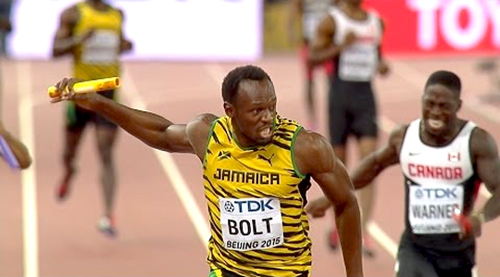Dec 30: Jamaican sprint superstar Usain Bolt shone at the Beijing World Championships, but athletics was later mired in a shocking doping-linked corruption scandal that plunged the Olympics' number one sport into crisis.
Bolt bagged an unprecedented fifth treble gold medal haul at a global championship in the Chinese capital in August, suitably in the same Bird's Nest stadium where his career took off in in the 2008 Olympics.
But the towering Jamaican's feats were overshadowed by revelations that threw track and field's world governing body, the IAAF, into turmoil.
At the same Beijing world champs where Bolt shone, former British double 1500M Olympic champions Sebastian Coe beat Sergey Bubka in a vote to take over from Lamine Diack as IAAF president.
No sooner was Coe installed than Diack was revealed to have accepted bribes worth up to one million euros to allow doped Russian athletes to compete. A "horror show", in Coe's words.
Coe, who was IAAF vice-president for eight years under Diack and had previously described the Senegalese as the sport's "spiritual leader", insisted he had had no inkling of corruption within his organisation.
Diack remains under investigations by French authorities, while the World Anti-doping Agency (WADA) is also preparing a report on allegations of corruption within the IAAF.
Such was the external pressure, Coe ended his 38-year association with US sportswear company Nike, for whom he worked in the lucrative role as an ambassador, in a bid to eliminate any possible conflict of interest.
The BBC had published an email from a senior Nike executive that suggested Coe had lobbied Diack for the 2021 World Championships to be awarded to Eugene, Oregon, where Nike was founded.
When asked if it had been in Nike's interest for the event to be awarded to Eugene -- which it was, without a formal bid process -- Coe said: "I don't conclude that."
The IAAF also provisionally suspended athletics powerhouse Russia in November, and both RUSADA (Russian anti-doping agency) and Moscow's anti-doping laboratory were banned over the bombshell WADA report alleging systematic state-sponsored doping.
The WADA panel was set up following allegations aired by Germany’s ARD network, which released another sensational report in partnership with The Sunday Times in the middle of the year, alleging cover-up by the IAAF of many suspicious tests that suggested doping.
Russian officials have vowed to reinstate the national athletics federation in time for track and field athletes to compete in next summer's Olympic Games and to fight the use of performance enhancing drugs in sport.
"We are against any kind of doping, first of all because doping destroys people's health," Russian President Vladimir Putin said. "Those who resort to doping, of course, must be punished accordingly."
After Russia, there were also shocking revelations in Kenya, an east African giant of the track that topped the medals table in Beijing.
The IAAF ethics commission suspended Isaiah Kiplagat, who led the national athletics federation for more than 20 years, along with his vice-president David Okeyo and former treasurer Joseph Kinyua over suspicions they had siphoned off sponsorship money from Nike and subverted anti-doping controls.
The question remains whether Coe is the man to instigate change.
Prior to becoming IAAF vice-president in 2007, the 59-year-old Briton was appointed as the first ethics commission chairman for world football's governing body FIFA, an organisation currently mired in corruption allegations of its own.
With links to two of the biggest scandals in modern sport, Coe nevertheless remained bullish when asked why people should believe that he is the right person to clean up athletics.
"Have there been failures? Yes. Will we fix them? Absolutely. I'm absolutely focused on doing that. If we don't do that, there are no tomorrows for my sport. This is the crossroads."
A neutral observer can only hope that the likes of Bolt and American Ashton Eaton, who bettered his own decathlon world record at Beijing, will be there to help track and field through its darkest moment.
Bolt’s battle with dope-tainted Justin Gatlin in the 100M was touted to be the highlight of the Beijing bash and it turned out to be just that, with the Jamaican edging out the American right at the finishline. He also retained his 200M and 4x100M relay gold medals to enhance his legendary status.
Briton Mo Farah, whose ties with American coach Alberto Salazar came under the scanner during the year, won another 5000-10000 double while American Christian Taylor prevailed in a superb triple jump contest.
In women’s events, the rise of Dutch sprinter Dafne Schippers was the talking point after she won the 200M while Ethiopian Genzebe Dibaba also stole the show in the 1500M after smashing a long-standing the world record just before Beijing.
Dibaba and Eaton were named the IAAF Athletes of the Year but the awards gala was cancelled, in tune with the prevailing mood. The New Year, certainly, will bring fresh challenges.






Comments
Add new comment